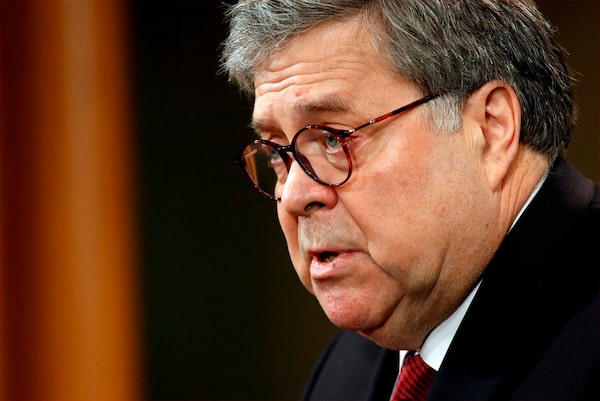Robert Mueller, the special counsel, wrote a letter in late March to Attorney General William Barr objecting to his early description of the Russia investigation’s conclusions that appeared to clear President Donald Trump on possible obstruction of justice, according to the Justice Department and three people with direct knowledge of the communication between the two men.
The letter adds to the growing evidence of a rift between them and is another sign of the anger among the special counsel’s investigators about Barr’s characterization of their findings.
It was unclear what specific objections Mueller raised in his letter, though a Justice Department spokeswoman said Tuesday evening that he “expressed a frustration over the lack of context” in Barr’s presentation of his findings on obstruction of justice. Barr defended his descriptions of the investigation’s conclusions in conversations with Mueller over the days after he sent the letter, according to two people with knowledge of their discussions.
Barr, who was scheduled to testify Wednesday before the Senate Judiciary Committee about the investigation, has said publicly that he disagrees with some of the legal reasoning in the Mueller report. Senior Democratic lawmakers have invited Mueller to testify in the coming weeks but have been unable to secure a date for his testimony.
A central issue in the dispute is how the public’s understanding of the Mueller report has been shaped since the special counsel ended his investigation and delivered his 448-page report March 22 to the attorney general. The four-page letter Barr sent to Congress two days later gave little detail about the special counsel’s findings and created the impression that Mueller’s team found no wrongdoing, allowing Trump to declare he had been exonerated.

Mr. Barr wrote in his letter that Mr. Mueller did not establish that the Trump campaign colluded with Russia.The Associated Press
But when Mueller’s report was released April 18, it showed Mueller believed that significant evidence existed that Trump obstructed justice.
“The special counsel emphasized that nothing in the attorney general’s March 24 letter was inaccurate or misleading,” a Justice Department spokeswoman, Kerri Kupec, said Tuesday.
The Justice Department received Mueller’s letter four days after Barr sent his conclusions to Congress. In response, the attorney general and the special counsel spoke on the phone, and Mueller laid out his concerns about the initial descriptions of the report.
At the time, the Justice Department had begun redacting the report, and Mueller raised the question about whether more of it could be released.
“The attorney general ultimately determined that it would not be productive to release the report in piecemeal fashion,” Kupec said. “The attorney general and the special counsel agreed to get the full report out with necessary redactions as expeditiously as possible.”
Barr and senior Justice Department officials were frustrated with how Mueller ended his investigation and drafted his report, according to the three people.
They expressed irritation that Mueller fell short of his assignment by declining to make a decision about whether Trump broke the law. That left Barr to clear Trump without the special counsel’s backing.
This content appears as provided to The Globe by the originating wire service. It has not been edited by Globe staff.